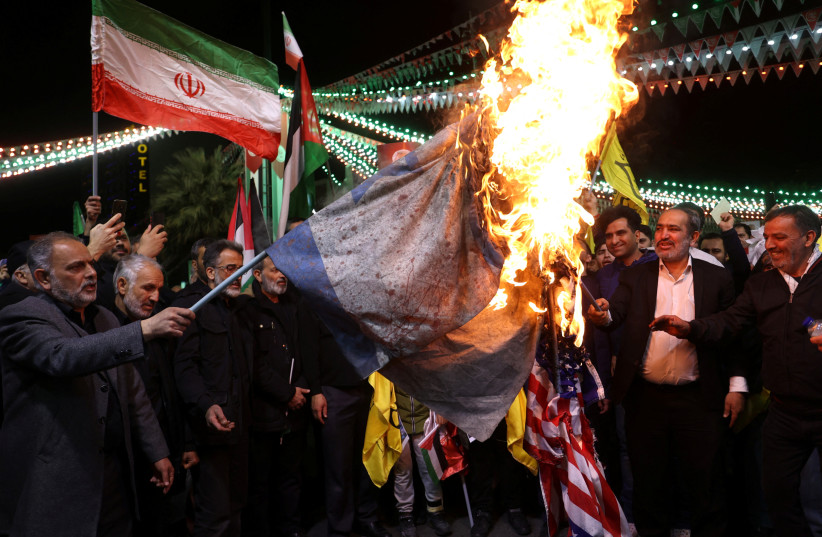The latest, rapidly changing, developments in the Gaza Strip crisis are clear evidence of the tense situation in the entire Middle East. Regardless of whether Israel and the Hamas terrorist movement reach an agreement, all options remain open, especially as any deal will neither mean the end of the war nor the beginning of a new era of calm.
Rather, it will be time for a breather and a reorganization of the cards, in which both sides divest themselves of internal and external pressures that they are facing to end the war.
Fundamentally, the nature of this war is neither about this narrow geographical area (365 sq. km.), nor the position of the terrorist movement – but is related to ongoing regional and international conflicts.
It is no secret that the Hamas is one of Iran’s key militias. In light of the numerous revelations since the beginning of the war, the connection between the two can no longer be concealed.
Even if tensions between Israel and Iran have temporarily eased and both sides are content to readjust the rules of the game according to the military messages exchanged, the confrontation between them is not over. There are likely more rounds and proxy wars to come – perhaps even a direct showdown.

We should not forget that Israel’s reckoning with other pro-Iranian movements and organizations, especially Lebanese Hezbollah, is still pending, as the security of northern Israel depends on the decisions of the pro-Iranian group and its inconsistent positions, which are often hard to predict, whether in terms of escalation or de-escalation.
The major and most complex political and negotiating challenge for the region and all international parties involved in de-escalating and ending the war in Gaza is to bridge the gap between Israel’s demands and security needs and the conditions set out by the Hamas terrorist group.
The two sides have wildly conflicting goals.
Restoring Israel’s sense of security, not to mention its power of deterrence and military prestige, requires that Hamas, an Iranian spearhead, be defeated, its extremist leaders purged, and the hostages be brought back by force, as Prime Minister Benjamin Netanyahu’s government promised at the beginning of the war.
On the other hand, from a strategic point of view, Hamas’s conditions essentially mean the defeat of Israel and the victory of the movement, which points to the different criteria for victory and defeat between regular armies and militia organizations.
Israel has suffered irreparable damage to its image
Israel has also suffered a significant strategic loss, not because it was subjected for months to one of the worst confrontations in its history with terrorism, but because its internal cohesion was shaken, whether by the erosion of confidence in the performance of the security and military establishments, or by deep political differences within Israeli society, which have largely revolved around the hostage deals.
All this will come to light when Israel reaches the inevitable moment of accountability, in which all events since the bloody terrorist attack of October 7 will be thoroughly investigated to reveal responsibility for the mistakes that brought about the deaths of some 1,200 civilians, mostly Israelis, and the capture of some 240 hostages by Hamas terrorists in the Gaza Strip – a major reason for prolonging the war in all its military, economic, political, and security respects.
In addition, this battle against terrorists has resulted in unrest and instability in most of the Middle East, revealing the geopolitical impact of the Gaza war on security and peace, especially in Arab countries close to the Strip.
Discussion must be revived about the relationship between the diverse ethnic and religious components (Arabs, Kurds, Europeans, Muslims, Christians, and others) living in a single homeland – as is the case in many Arab countries such as Jordan and Lebanon – where this diversity is exploited to instigate hostility and hatred, supported by pro-Iranian terrorist groups.
Above all, this dovetails with the outsized dominance of new media, fronted by social media platforms and networks, and the massive decline in the role and reach of traditional media. Its ability to steer people’s orientations and public opinion toward rational viewpoints has been virtually lost, especially among young people, as it becomes hard to change attitudes and beliefs based on TikTok.
In most cases, the reins are now in the hands of influencers and opinion leaders on social media, many of whom belong to extremist and radical ideologies and pursue questionable pro-Iranian agendas.
The writer is a UAE political analyst and former Federal National Council candidate.
